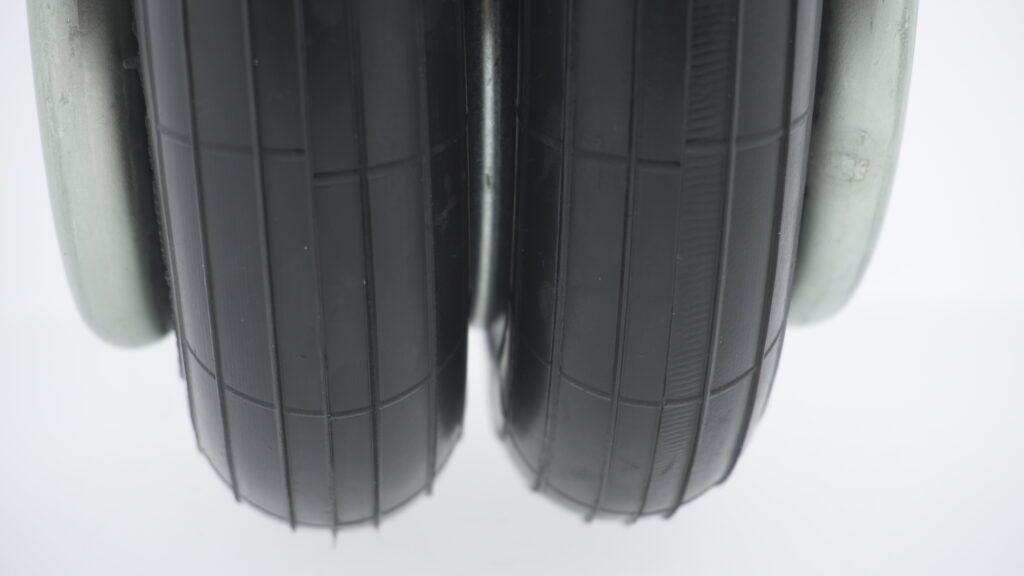
The Superior Performance of Air Bellows in Lift-and-Lower Applications
Air bellows have emerged as the preferred choice for lift-and-lower systems across various industries due to their exceptional load capacity, precise height control, and low maintenance requirements. These pneumatic actuators provide smooth lifting operations, making them ideal for material handling, automated production lines, and vehicle suspension systems. Their shock absorption properties ensure stability during lifting, minimizing vibrations and improving operational efficiency. Additionally, air bellows work effectively in harsh environments, thanks to their durable rubber construction and reinforced fabric layers. They deliver consistent performance across varying loads, making them indispensable in industrial automation. With their ability to control movement precisely, they contribute to safer and more efficient lifting operations, extending machine life and reducing downtime. This unique combination of performance, durability, and adaptability makes air bellows the ultimate choice for lifting applications.
Key Advantages of Air Bellows in Industrial Applications
1. High Load-Bearing Capacity
Air bellows can support substantial weights while maintaining consistent performance. Unlike traditional hydraulic or mechanical systems, pneumatic air springs distribute forces evenly, reducing stress concentrations and extending equipment life. The rubberized construction allows greater flexibility, preventing overstressing of components. Unlike rigid lifting mechanisms, air bellows can expand and contract smoothly, ensuring controlled movements and minimal mechanical wear. Their design makes them highly resilient under heavy-duty operations, making them a preferred choice for industrial applications that require frequent load adjustments. The lightweight yet durable structure also helps reduce energy consumption, making them an efficient alternative to conventional lift systems. Furthermore, air bellows are engineered to maintain structural integrity under prolonged use, reducing the risk of unexpected failures in critical applications.
2. Superior Vibration and Shock Absorption
A critical advantage of rubber air bellows is their ability to absorb vibrations and shocks, ensuring stable operation even in harsh industrial environments. This feature is particularly beneficial for press machinery, conveyor systems, and precision lifting applications. By reducing resonance and impact forces, air bellows enhance equipment longevity and minimize stress-related wear. Traditional lifting systems often transfer undesirable vibrations to connected components, leading to increased maintenance requirements. However, air bellows act as natural dampers, preventing unwanted oscillations that could compromise precision-based applications. Additionally, their ability to adapt to varying pressure levels allows for a customized response to dynamic loads, ensuring smooth and controlled lifting. Industries requiring high precision positioning, such as robotic assembly lines and testing facilities, benefit significantly from this unique property.
3. Adjustable and Precise Height Control
One of the defining characteristics of air bellows is their adjustable height capabilities. By regulating air pressure, operators can achieve precise positioning, enhancing efficiency in automated systems and ergonomic workstations. Unlike hydraulic or mechanical systems, air bellows allow fine-tuned control over height adjustments, ensuring accuracy even in complex setups. Their adaptability makes them ideal for applications requiring gradual elevation changes, such as lifting platforms, material transport systems, and adjustable conveyor belts. Additionally, air bellows provide a quick response time, allowing for immediate height corrections when necessary. This level of control and precision makes them an indispensable component in industries that prioritize efficiency and accuracy.
4. Long-Lasting Durability and Minimal Maintenance
Air bellows are designed with reinforced elastomer compounds, ensuring long-term durability in extreme conditions. Unlike hydraulic cylinders that require frequent fluid changes, air bellows operate with minimal maintenance, reducing downtime and operational costs. Their seamless rubber construction prevents fluid leaks, a common issue with hydraulic systems. Moreover, their ability to withstand harsh environments, including temperature fluctuations and chemical exposure, ensures reliable performance in industrial applications. Businesses seeking cost-effective solutions benefit from their low-maintenance design, as fewer breakdowns translate to lower repair costs and increased productivity.
Applications of Air Bellows in Lift-and-Lower Systems
1. Automotive Industry
In vehicle suspension systems, air bellows enhance ride comfort, shock absorption, and load leveling. They are commonly used in buses, trucks, and trailers, where adaptability to varying loads is essential. The ability to dynamically adjust air pressure allows vehicles to maintain stability, even under shifting loads. Additionally, air bellows contribute to fuel efficiency, reducing energy losses caused by excessive vibrations. Their ability to adapt to road conditions makes them ideal for long-haul transport and off-road applications.
2. Manufacturing and Automation
Air bellows are widely integrated into automated production lines, facilitating smooth lifting, precise positioning, and shock absorption in robotic systems, conveyor systems, and industrial presses. The high-speed adaptability of air bellows enhances production efficiency, ensuring that equipment maintains consistent output rates. Their reliability also reduces the likelihood of unexpected breakdowns, ensuring uninterrupted workflow.
3. Material Handling Equipment
Air bellows are a key component in scissor lifts, palletizers, and lifting tables, where high load capacity and adjustable height are required for seamless material transfer. They provide reliable support while maintaining structural integrity under frequent loading and unloading operations. Their low energy consumption makes them a cost-efficient solution for industries focused on sustainability.
4. Railway and Aerospace
Railway and aerospace industries rely on air suspension systems to provide enhanced stability, load distribution, and reduced vibrations, ensuring passenger comfort and structural integrity. Air bellows help improve safety standards, ensuring smooth operations under extreme conditions. Their use in shock isolation systems protects sensitive components from excessive wear, extending the lifespan of critical structures.
Air bellows provide a versatile, durable, and cost-effective solution for lift-and-lower systems across multiple industries. Their high load-bearing capacity, vibration isolation, and adjustability make them the optimal choice for applications requiring smooth, precise, and maintenance-free lifting operations. By integrating air bellows, businesses can achieve enhanced efficiency, improved safety, and reduced maintenance costs, making them a superior alternative to traditional lift systems.
